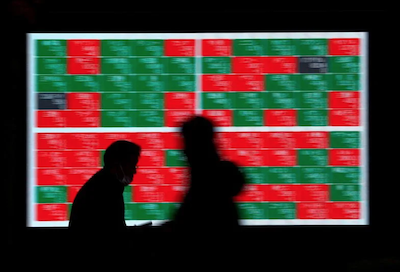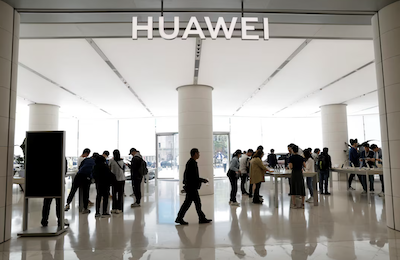Asia’s stock markets saw a mixed day on Wednesday with continuing uncertainty over US interest rates and the likely impact of China’s latest efforts to restart its economically-critical property sector weighing heavily on sentiment.
But as well as keeping a wary eye on the outlook for US and UK interest rates, traders were daring to hope AI-diva Nvidia could meet sky-high expectations.
Markets are braced for fireworks when Nvidia reports after the US bell, with options priced for a swing of 8.7% in either direction, worth $200 billion in market value.
Also on AF: Google, Meta, Microsoft, Others Agree on AI ‘Red Lines’
Japan’s Nikkei share average fell amid cautious outlooks for domestic firms and uncertainties about rate and currency moves impacting the mood.
The Nikkei share average fell 0.85%, or 329.83 points, to close at 38,617.10, while the broader Topix was down 0.81%, or 22.36 points, to 2,737.36.
“The whole world is awaiting the result of Nvidia. The outcome will affect global stocks, particularly the US equities, which will affect Japanese stocks,” said Shuji Hosoi, senior strategist at Daiwa Securities.
Heavyweight chip stocks, which helped the Nikkei scale a record intraday high of 41,087.75 on March 22, sagged ahead of the earnings. Tokyo Electron declined 1.2% and Advantest, which counts Nvidia among its customers, fell 0.8%.
Markets are also bracing for further rate hikes by the Bank of Japan this year. Bond yields have risen this month on hawkish hints from the central bank as it seeks to contain the yen’s depreciation.
Mainland China stocks edged up, driven by a rebound in property sector after two days of decline. The market has been closely monitoring the effectiveness of the latest real estate stimulus measures unveiled on Friday.
The CSI 300 Real Estate index and Hong Kong’s Hang Seng Mainland Properties Index jumped 4.8% and 2.3%, respectively, by midday, after slipping in the previous two sessions.
China Blue-Chip Gains
Adding to that sentiment, the first batch of China’s 1 trillion yuan ($138.14 billion) ultra-long special treasury bonds, which debuted on Wednesday, surged 25% in the morning session on the Shanghai Stock Exchange, triggering trading suspensions.
China’s blue-chip CSI300 index was up 0.23% with, earlier in the session, its financial sector sub-index higher by 0.9%, the consumer staples sector down 1.06% and the healthcare sub-index down 0.73%.
The Shanghai Composite Index edged up 0.02%, or 0.57 points, to 3,158.54, while the Shenzhen Composite Index on China’s second exchange was ahead 0.24%, or 4.19 points, to 1,784.69.
Chinese H-shares listed in Hong Kong – stocks belonging to companies from the Chinese mainland – rose 0.31% to 6,842.2, but the more international-facing Hang Seng Index dipped 0.13%, or 25.02 points, to end at 19,195.60.
Elsewhere across the region, in earlier trade, most markets rose with Sydney, Mumbai, Wellington, Taipei and Jakarta all in positive territory but Seoul fell.
MSCI’s broadest index of Asia-Pacific shares outside Japan firmed 0.4%, having already climbed for four straight weeks to reach a two-year top.
Eurostoxx 50 futures and FTSE futures both inched up 0.1%. S&P 500 futures and Nasdaq futures barely budged.
UK Rates Wait
Minutes of the US Federal Reserve’s last meeting due later in the day should confirm the next move is still likely down but policy makers first need more confidence that inflation has resumed its downtrend.
Fed fund futures imply about a 66% chance of a rate cut by September and have 43 basis points of easing priced in for this year.
Figures on UK inflation due later in the session could decide whether the Bank of England eases as early as June, or waits to August.
Forecasts are for core consumer price inflation to slow to 3.6% in April, from 4.2% in March, and anything lower would narrow the odds on a June cut and likely pressure sterling.
The dollar firmed a touch on the yen at 156.36 as the threat of Japanese intervention restrained its advance.
Gold eased to $2,413 an ounce, after touching a record high of $2,449.89 early in the week.
Oil prices slipped amid concerns over the peak US driving season, given that demand was seasonally tracking at its lowest since 2020 and retail prices had fallen for four weeks in a row.
Key figures
Tokyo – Nikkei 225 < DOWN 0.85% at 38,617.10 (close)
Hong Kong – Hang Seng Index < DOWN 0.13% at 19,195.60 (close)
Shanghai – Composite > UP 0.02% at 3,158.54 (close)
London – FTSE 100 < DOWN 0.29% at 8,391.70 (0924 BST)
New York – Dow > UP 0.17% at 39,872.99 (Tuesday close)
- Reuters with additional editing by Sean O’Meara
Read more:
Hedge Funds Build Holdings in Underpriced Chinese Equities
China’s Shaky Recovery: Fiscal Revenue Down 2.7% This Year
Aussie Who Said he Invented Bitcoin Lied on ‘Grand Scale’: Judge
Hang Seng Dips as Tech Weighs, Nikkei Drops on Rate Uncertainty
























